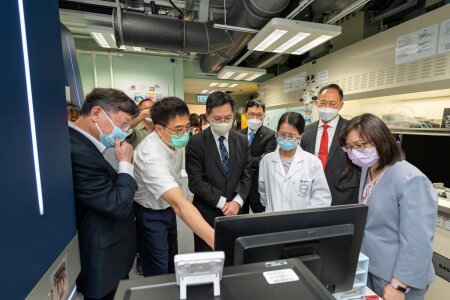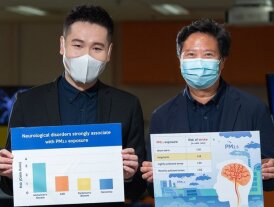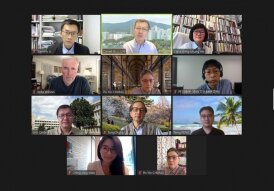
Secretary for Innovation and Technology visits HKBU

Mr Alfred Sit Wing-hang, Secretary for Innovation and Technology, and Ms Rebecca Pun Ting-ting, Commissioner for Innovation and Technology of the HKSAR Government, visited the State Key Laboratory of Environmental and Biological Analysis at Hong Kong Baptist University (HKBU) today (3 September), and exchanged views with HKBU's senior management on issues relating to the development of Hong Kong's innovation and technology.
During the visit, Professor Alexander Wai, President and Vice-Chancellor of HKBU, shared with the Government representatives the University's latest directions and achievements in research and development, its efforts in nurturing research talents for Hong Kong, as well as its strategies in strengthening collaborations with research bodies and industry partners in the Mainland, especially the Greater Bay Area.
Professor Wai also introduced the University's interdisciplinary strategy in research, which is supported by the establishment last year of six interdisciplinary research laboratories, namely the Augmented Creativity Laboratory, the Computational Medicine Laboratory, the System Health Laboratory, the Smart Society Laboratory, the Data Economy Laboratory, and the Ethical and Theoretical AI Laboratory.
The State Key Laboratory of Environmental and Biological Analysis aims to promote novel analytical fundamental research with persistent organic pollutants (POPs) that affect the environment, food safety and public health. Professor Cai Zongwei, Director of the Laboratory and Chair Professor in Chemistry, shared on the latest developments of the Laboratory and its state-of-the-art facilities. He introduced the Laboratory's three pioneering research areas, which are toxicology research on POPs; establishment of an integrated platform of proteomics and metabolomics for POPs associated disease studies; and development of the new biosensing and bioimaging techniques for environmental pollution and human health research.
With the HKBU Institute for Research and Continuing Education (IRACE) in Shenzhen acting as a platform, the Laboratory will continue to strengthen research and academic collaborations with its Mainland counterparts. In recent years, the Laboratory has jointly established the "Guangdong-Hong Kong-Macao Joint Laboratory for Contaminants Exposure and Health" with top universities in Guangdong and Macau, aiming to establish a comprehensive environmental pollutant assessment system for the Greater Bay Area.
Previous News
Next News



